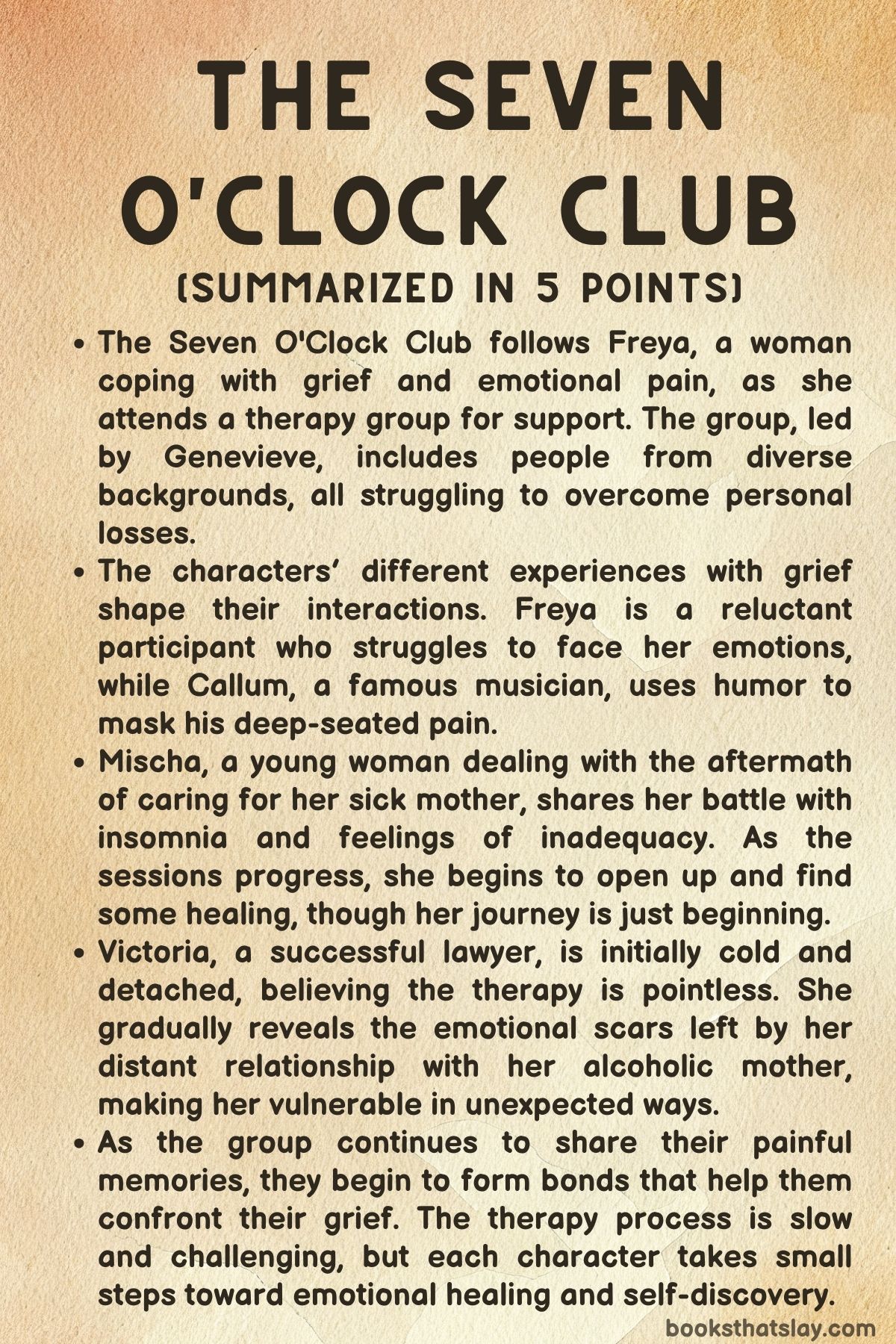The Seven O’Clock Club Summary, Characters and Themes
The Seven O’Clock Club by Amelia Ireland is a profound exploration of grief, healing, and emotional resilience. The story centers on Freya, a woman struggling with the painful loss of her daughter, Alaia.
She, along with three other individuals—Mischa, Victoria, and Callum—attends a therapy group led by Genevieve, a psychologist determined to help people process their trauma in an unconventional manner. Through group therapy sessions, they share their emotional burdens, confront personal demons, and support each other in navigating the difficult path toward recovery. The narrative intricately weaves each character’s journey of self-discovery, as they deal with personal losses, guilt, and the challenge of moving forward.
Summary
Freya, the protagonist of The Seven O’Clock Club, finds herself in a deep emotional struggle following the loss of her daughter, Alaia. Isolated for six months, she hasn’t left her house and feels trapped by her grief and anxiety.
When she reluctantly agrees to attend a therapy group, she joins three other participants: Mischa, a young woman who is coping with the loss of her mother; Victoria, a lawyer who hides her deep-seated anger and emotional scars; and Callum, a famous musician whose fame and past addictions have left him emotionally numb.
The therapy sessions, led by Genevieve, aim to help these individuals confront their grief in a supportive environment. Each participant has their own reasons for being there, and their personal struggles shape their journey throughout the story.
Freya, for example, struggles with even the simplest social interactions and feels exposed when asked to open up. Her initial resistance to the process is clear as she experiences a panic attack during her first session.
However, as the group begins to share their personal stories, Freya starts to feel a sense of catharsis. As she reveals her grief over her daughter’s death and the deterioration of her marriage with Joe, she begins to confront her emotional pain.
Mischa, a twenty-year-old woman who had cared for her sick mother, is also finding it difficult to cope with her loss. She struggles with insomnia, emotional emptiness, and suppressed anger, which have kept her from moving forward.
Her experience in therapy begins to uncover the depth of her unresolved emotions and the difficulty of adapting to a life without the mother she once cared for.
Victoria, a middle-aged lawyer, presents herself as emotionally distant and uninterested in the group therapy. She insists that she only attends out of obligation to her husband.
Beneath her cold exterior, however, Victoria has a history of emotional repression stemming from her relationship with her alcoholic mother. As she shares a memory of her childhood, it becomes clear that she has been shaped by emotional neglect and a lifetime of buried pain.
Callum, a successful musician, initially dismisses the therapy sessions as useless, participating only due to the insistence of his record label. His fame, which started with humble beginnings as a young guitar player, has caused him immense stress, leading to self-destructive behavior, including drug addiction.
Despite his apparent indifference, Callum gradually opens up about his tumultuous life. His struggle with addiction and the emptiness that fame brought him is revealed over time, and he starts to reflect on the emotional toll that his fame has taken on him.
As the therapy sessions continue, Genevieve encourages each of them to share memories from their pasts. These stories, meant to reconnect them with a time of innocence and joy, often trigger deep sadness and regret.
Each group member begins to understand that confronting their pain is necessary for healing. The therapy group becomes a space where individuals, once reluctant and isolated, slowly start to support each other in their journeys.
Freya’s internal conflict becomes central to her healing process. She finds it difficult to let go of the expectations she had for her life, especially her marriage with Joe, which was marked by unspoken resentment and unresolved issues.
Through therapy, Freya begins to acknowledge that moving forward requires letting go of past expectations, including the need for closure in her relationship with Joe.
Mischa’s journey is similarly painful. Her feelings of inadequacy and shame prevent her from fully embracing her new life.
Yet, the support she receives from the therapy group begins to alleviate some of her isolation. While she is still in the early stages of recovery, the group helps her realize that she is not alone in her struggles.
Victoria, on the other hand, remains emotionally shut off for much of the story. Her inability to confront her emotions is a direct result of her difficult upbringing and strained relationship with her mother.
As the therapy progresses, Victoria starts to reflect more on her past, including the guilt she feels for not reconciling with her mother before her death. Her detachment, however, remains a significant barrier to her healing.
The group begins to bond over their shared vulnerabilities, each person confronting their grief in their own way. Freya, Mischa, and Callum each take steps toward emotional recovery, realizing that healing is a gradual process filled with setbacks.
Through their collective experiences, the group learns that emotional honesty, though difficult, is essential for recovery.
The sessions also emphasize the importance of vulnerability. As the characters gradually open up to each other, they begin to see the value in expressing their emotions and facing their pain directly.
Genevieve’s role as a facilitator is crucial in creating a safe space where each member can explore their grief without judgment.
As the story unfolds, Freya starts to see that there is hope for her future. The bond she forms with Callum, though fragile, provides some emotional support.
Callum, in turn, begins to take responsibility for his past actions and struggles with addiction, realizing that healing is possible if he opens up and faces the truth of his experiences.
The final chapters of the book focus on the group’s individual decisions to confront their pasts. Victoria, Mischa, and Callum all wrestle with their personal demons, but Freya’s journey is the most poignant.
As she reflects on her relationship with her daughter, her grief becomes a central theme in the story. The decision to confront this grief marks a significant moment in Freya’s emotional recovery.
In the end, the therapy group achieves a sense of mutual support and understanding. Each member, despite their different backgrounds and struggles, learns that it is possible to move forward in life, even after experiencing immense pain.
The therapy sessions, which started as a place of resistance and discomfort, become a powerful tool for emotional healing, offering each member the opportunity to face their trauma and ultimately find peace.

Characters
Freya
Freya, the protagonist of The Seven O’Clock Club, is a woman deeply struggling with grief and the aftermath of a tragic loss. She has isolated herself for six months, unable to leave her house or engage with the outside world.
Her internal battle with vulnerability is at the forefront, as she attends group therapy reluctantly, unsure if confronting her pain is the right course of action. Despite her resistance, Freya begins to unravel the layers of her grief during the therapy sessions, particularly her loss of a daughter, Alaia, which plays a pivotal role in her emotional journey.
Over time, Freya starts to confront her past, including the dissolution of her marriage with Joe, and comes to terms with the need to face her emotions to heal. Her path toward healing is slow but marked by moments of profound self-reflection and the decision to reconnect with her loved ones in an emotional, though painful, journey.
Mischa
Mischa is a young woman grappling with the emotional consequences of having cared for her mother during her illness. At twenty years old, she is still struggling with the emptiness left by her mother’s death and the sense of disconnection she feels from the world around her.
Though she has managed to find a new job, Mischa’s emotional landscape remains troubled, with lingering feelings of anger and confusion. In therapy, Mischa opens up about her struggles, revealing a tendency to suppress her feelings, especially her anger.
Her emotional journey is one of reconciling with a reality she had once hoped would be different, but through the support of the therapy group, she begins to heal. Despite her challenges, Mischa finds solace in the group’s shared experiences and the understanding they offer.
Victoria
Victoria, a middle-aged lawyer, initially appears detached and cold, and she seems out of place in the group therapy setting. She is there because of an obligation to her husband, not because she feels any personal need to seek help.
Throughout the therapy sessions, Victoria’s internal world is revealed to be much more complex than her outward appearance suggests. She shares a painful memory of her childhood and her emotionally distant relationship with her alcoholic mother.
Despite her seemingly indifferent attitude toward her mother’s death, Victoria wrestles with guilt, finding herself justifying her emotional coldness as a form of self-preservation. Her journey in therapy is one of slowly unearthing the buried emotional wounds from her past and beginning to reconcile with the idea that her emotional detachment may be a barrier to her own healing.
Callum
Callum, a famous musician, enters the therapy sessions with resistance and reluctance. He is initially there because of a demand from his record label, not because he wants to address his emotional turmoil.
Despite his fame, Callum feels lost and disconnected from the world around him. The pressures of stardom, including constant media attention and superficial relationships, have left him feeling empty and alone.
He turns to drugs to numb the pain, which leads him into a destructive spiral. However, over time, Callum begins to confront his addiction, guilt, and regrets, especially through conversations in therapy.
His journey is one of self-discovery and confronting the dark side of fame that he had previously ignored. Although he still struggles with self-loathing, Callum starts to take responsibility for his actions and begins to understand the importance of emotional vulnerability in the healing process.
Genevieve
Genevieve, the therapist and facilitator of the group therapy sessions, is a young psychologist with a non-traditional approach to helping her clients cope with grief. Her role in The Seven O’Clock Club is to guide the group through their emotional journeys, helping them open up about their pasts and confront the pain they have been avoiding.
While Genevieve remains professional and empathetic, she also reveals her own vulnerabilities through the course of the narrative, particularly in her interactions with the group members. She encourages them to share their childhood memories as a way to reconnect with lost joy, though this process often triggers intense emotional reactions.
Genevieve’s steady presence helps the group bond, and she is a crucial figure in facilitating their healing, offering gentle but firm guidance when needed.
Olivia
Olivia, introduced in the epilogue of The Seven O’Clock Club, represents a new chapter of life and growth. She works as a waitress at Crazy Joe’s BBQ Pit, leading a relatively simple life compared to the complex emotional struggles of the primary characters.
Olivia’s brief interaction with Seb, a man who feels strangely familiar to her, suggests the potential for new beginnings, connecting her to the larger themes of emotional healing and interconnectedness. Her story, while not deeply explored in the main narrative, hints at the possibility of new relationships and the cyclical nature of human connections, leaving readers with a sense of hope and the potential for emotional recovery.
Themes
Grief and Loss
Grief is a central theme in The Seven O’Clock Club, explored through the personal and often painful experiences of the characters. Each of the main figures in the story struggles with the weight of loss in their own way.
For Freya, the protagonist, the loss of her daughter, Alaia, is the defining tragedy of her life. She faces a profound sense of emptiness that not only affects her ability to function but also dictates her relationship with the world around her.
The grief Freya experiences prevents her from connecting with others, and she spends much of the story grappling with whether to confront her sorrow or avoid it altogether. The therapy group setting offers her a space to face this grief, even as she remains resistant to the process.
Similarly, Mischa’s grief stems from the loss of her mother, an experience that leaves her feeling isolated and adrift. Her emotional struggles are compounded by unresolved anger and feelings of inadequacy, showing how grief can manifest in complicated ways.
Victoria, too, deals with a form of grief, albeit a more complex one related to her relationship with her emotionally distant mother. Her mother’s alcoholism and eventual death create a source of internal conflict for Victoria, who feels guilty for not reconciling with her before it was too late.
The theme of grief is not limited to the characters’ personal losses but extends to their inability to move on. Callum, for example, uses drugs as a way to numb the pain of his fame-induced isolation, revealing the destructive coping mechanisms people sometimes adopt when dealing with deep emotional wounds.
Throughout the book, the therapy sessions become a space for characters to slowly unravel the layers of their grief, seeking healing through vulnerability and emotional honesty.
Vulnerability and Emotional Honesty
The Seven O’Clock Club consistently emphasizes the importance of vulnerability and emotional honesty as essential components of healing. Initially, many of the characters struggle to let down their emotional walls.
Freya, Mischa, and Victoria all exhibit various forms of emotional detachment, whether it’s Freya’s refusal to face the full impact of her loss or Victoria’s coldness in her interactions with her family and the therapy group. However, as the story progresses, they begin to realize the value of sharing their pain.
Freya’s eventual decision to open up about her daughter’s death represents a major turning point in her character’s development, demonstrating that confronting grief head-on can lead to self-discovery and healing.
Callum, too, experiences a gradual shift in his relationship with vulnerability. His initial reluctance to participate in therapy sessions is grounded in his belief that his fame and success somehow exempt him from needing emotional support.
Yet as he shares more about his past, including his struggles with drug addiction and the emptiness that followed his rise to stardom, Callum begins to uncover a more authentic side of himself. The act of sharing his story with the group, despite his attempts to mask his emotions with humor, allows him to come to terms with his guilt and self-loathing.
Mischa’s journey also underscores the role of emotional honesty in recovery. At first, she feels alienated from the group and trapped in her own emotional turmoil.
But through her interactions with others, she gradually learns that confronting her pain—without judgment or suppression—helps her begin to heal. The therapy group becomes a safe space for the characters to shed their emotional armor, revealing that true emotional healing is possible only when one allows themselves to be vulnerable.
Isolation and Connection
Isolation is another prominent theme in the novel, explored both physically and emotionally. Many of the characters start the story in states of profound isolation.
Freya’s withdrawal from the world, marked by her inability to leave her house for six months, exemplifies how grief can cause individuals to retreat from society. Mischa’s emotional isolation is similar; despite being surrounded by others, she feels a deep sense of loneliness, largely because she hasn’t allowed herself to heal from the trauma of caring for her sick mother.
Victoria’s emotional coldness and self-imposed distance from her mother further highlight the theme of isolation, especially in her resistance to forming meaningful connections.
Despite their initial isolation, the therapy group becomes a space for the characters to break free from their emotional loneliness. The process of sharing painful memories and raw emotions fosters a sense of understanding and connection among them.
Over time, Freya, Mischa, Callum, and Victoria each begin to find solace in their shared vulnerability, realizing that they are not alone in their struggles. The relationships they form within the group, though imperfect and sometimes fraught with tension, offer them a sense of community and the possibility of healing.
The theme of connection is also present in the metaphysical elements of the story, particularly as Freya and Callum face the prospect of transitioning to the “Higher Plane” after death. In this otherworldly space, the characters are confronted with the potential to reconnect with loved ones, but they also grapple with the emotional risks of doing so.
The decisions they make about whether to return to Earth and say goodbye to those they’ve left behind further emphasize the theme of connection, showing that human bonds transcend even death itself.
Self-Destruction and Redemption
Self-destruction is a theme that runs through the narrative, particularly in the lives of Callum and Victoria. Callum’s self-destructive behavior, particularly his addiction to drugs and the cycle of numbness he tries to maintain, represents the extreme measures people sometimes take to escape their inner pain.
His rise to fame, which was supposed to bring him happiness and fulfillment, instead brings him loneliness, superficial relationships, and ultimately, a sense of emptiness. His drug use serves as a temporary escape from the harsh reality of his life, but it only exacerbates his emotional turmoil.
It is through his participation in the therapy sessions that he begins to confront the root of his problems, understanding that true redemption can only come from facing his pain instead of running from it.
Victoria, too, exhibits self-destructive tendencies, but in a different form. Her coldness toward her family, particularly her mother, and her refusal to engage emotionally with others show how repression and avoidance can erode one’s sense of self.
Victoria’s internal struggle to reconcile her past with her present is a form of emotional self-destruction, as she holds on to anger and guilt rather than addressing her feelings. Her journey through the therapy sessions is marked by moments of self-awareness, where she begins to understand how her emotional detachment has shaped her life.
Through these characters, the story explores the idea that redemption is possible, but it requires individuals to confront their mistakes, take responsibility for their actions, and be willing to change. In the end, both Callum and Victoria show signs of redemption as they begin to face their demons, signaling that recovery from self-destruction is a gradual but achievable process.
The Afterlife and Transformation
The novel’s exploration of the afterlife introduces a philosophical and metaphysical dimension to the narrative, adding layers to the characters’ emotional journeys. As Freya, Callum, and the others transition from life to the “Higher Plane,” they are confronted with the consequences of their choices and the unfinished business they have left behind.
The afterlife serves as a space for the characters to reflect on their lives, confront their unresolved emotions, and make decisions that will determine their futures. Freya’s desire to return to Earth to say goodbye to her daughter symbolizes her need for closure and her unwillingness to let go of the past.
However, the metaphysical nature of the afterlife also raises questions about the consequences of staying attached to the earthly world.
Callum’s reluctance to return to his family and confront his past is driven by his fear of self-punishment and the emotional weight of his mistakes. His journey represents the difficulty of moving forward and letting go of guilt, a process that is further complicated by the reality of the afterlife.
The concept of the metaphysical gateways that connect souls to Earth serves as a reminder of the fragile nature of human connections and the difficulty of severing ties with the past.
Ultimately, the afterlife theme in The Seven O’Clock Club suggests that transformation is possible even after death, and that the process of healing and redemption extends beyond the physical world. The characters’ decisions in the afterlife are as important as the choices they made in life, offering a powerful commentary on the nature of existence, connection, and the potential for growth even after death.


